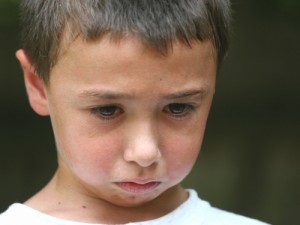* Johnny cries and resists going to school every morning.
* Suzie is afraid of throwing up and won’t go into any supermarket, because the first time she was in a food store, she vomited.
* Liam doesn’t sleep well because he becomes so worried the night before a test.
* Janine is afraid of speaking up in front of her friends for fear that they will make fun of her, so she goes along with whatever they want to do and never expresses her own opinion.
All four of these children struggle with symptoms of anxiety.
Anxiety is excessive fear, worry or nervousness. It can come from a stressful experience or can be a reaction to anticipating a future stressor. It can also be a reaction to anticipating a future stressful experience. Children are often, less able to understand the events that trigger their worries than adults are, but just like grown-ups, they can have physical symptoms, uncomfortable emotions, and scary thoughts, as a result of fear or worry.
Recently, I met with parents of elementary and middle school children in several school districts. We discussed what their children were experiencing, what was normal and what was not, and how parents could help them. Their levels of concern confirmed what the 2015 Pew Research Center Study (insert link) called “Parenting in America” found: parents are more likely to worry that their children will be anxious, bullied, or depressed, than almost any of the other concerns studied.
So how can you know when your child’s anxiety is not appropriate for his or her age and additional help is needed? Consider the following warning signs:
If the worry does not shut off when the situation has passed
If the anxiety lasts longer than it should
If the child’s performance suffers
If the worry is not due to a specific situation
If the anxiety flares up at inappropriate times
So what can you do? Often, parents feel so worried about the what the child is experiencing that they have difficulty knowing how to help alleviate the situation. In addition, even if the child’s symptoms do not qualify for a mental health diagnosis, recent research has shown that if parents deal with this “almost anxiety” early in the process, the child is less likely to develop a full blown anxiety disorder.
Here are some TIPS that parents can use to help their sons or daughters:
Do not think of your child’s anxiety as an isolated experience. Consider if there are any other worries that are part of what the child feels. For example, does the child have problems being separated from Mom or Dad such that it affects not just going to school but going to a birthday party or visiting Grandma? Often there is a constellation of anxiety, or pattern, that can fall under separation issues, social issues, or generalized anxiety about everyday things. It helps to have the full picture in order to deal better with a child’s anxieties.
Monitor your own reactions when dealing with your child’s anxiety. If you tend to overreact, criticize, or judge the child’s behavior, you will add an unnecessary layer of pressure to that which already exists. Stay calm and be empathic.
Model good anxiety coping skills yourself and discuss them with your child.
Help your child to tease out the that are scary or frightening. Often, the thoughts are not accurate and you can help the child understand what the real situation is. For example, if the child is worried about mom leaving him at school, the thought might really be, “I am afraid that she is not coming back.” Help your child to examine the evidence and to remember that you have always been there to pick him up.
Making the child aware of his “self-talk” , the thoughts in his head, can help him cope in future worrisome situations if that self-talk is positive. Negative self-talk will increase anxiety and lead to pessimism.
Work with your child to minimize avoidance. Often avoiding the worry- provoking situation becomes more of a problem than the anxiety itself.
Reassuring your child is fine, , but if you have to do it over and over again means that the child has not internalized what you are saying. Try to get your child to repeat what you have said in his or her own words. The decrease in anxiety from reassurance is short-lived and will not provide a lasting solution.
Help your child to keep track of times she has dealt with the anxiety independently. This kind of self-monitoring can help the child see the progress being made.
Avoid empty reassurance like “Don’t’ worry, it will get better.” If it does not get better, your parental credibility suffers.
Helping an anxious child can be difficult work and can be frustrating at times. If the anxiety results in a child feeling distressed and not being able to function, it is time to seek professional help; however, don’t discount the support that you can provide as a parent. Encourage your child to work with you and to be creative in looking for solutions. Often, when children participate in figuring out what techniques to try, they are more invested in participating in them. And, including children in the process of getting better creates a sense of empowerment that leads to better coping skills in the future.
All material contained on this blog is for information purposes only. This information is not intended or implied to be a substitute for professional psychological advice. Always consult a qualified professional prior to utilizing any of the information provided in this post.

